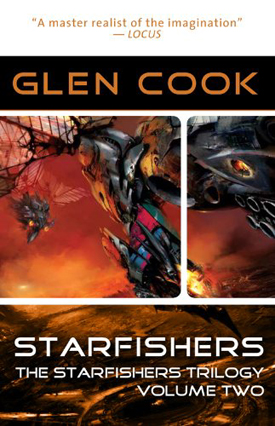 Starfishers continues the story of Masato Igarashi Storm and his vendetta against the Sangaree begun in Shadowline. Compared to its predecessor, it’s a very different kind of story.
Starfishers continues the story of Masato Igarashi Storm and his vendetta against the Sangaree begun in Shadowline. Compared to its predecessor, it’s a very different kind of story.
The man who is known these days as Moyshe benRabi is, to put not too fine a gloss on it, a spy. He seems to be partnered regularly with the man he knows as Mouse, small, with more than a little Asian in his ancestry. And they are on an important mission: the Starfishers, those reclusive, near-legendary spacefarers who provide all of that commodity known as “ambergris” that is the critical necessity for interstellar communication, have advertised for workers for one of their gigantic harvest ships, an unheard-off occurrence. Needless to say, benRabi and Mouse are not the only spies among the applicants, but the only other one they spot for sure is Maria Gonzalez, a Sangaree who has a history with benRabi — and no, she is not his friend. And of course, the Confederation Navy is not the only one interested in unlocking the secrets of the Starfishers, which is why there’s a Sangaree aboard. Plagued by migraines all his life, benRabi, much to his own surprise, finds himself possessed of an ability much prized by the Starfishers. The Starfishers, not being quite the hicks that some would like to believe, have their own agenda as far as benRabi is concerned, and waste no time trying to turn both him and Mouse. It’s not until the end of the story that benRabi learns how devious Beckhart, his commander, really is.
Since this is a story by Glen Cook, it may be taken as a given that there are layers of motivation here, and no one is innocent. It’s not about the guessing games, though. Cook has taken the opportunity to build within the confines of a fairly low-key “thriller” a strong portrait of benRabi, who is the main focus of the story. He uses the same device he used so effectively in Shadowline to build the context and lay in benRabi’s history, moving from past to present without a hitch, never telling us too much but giving us the clues we need to put the story together. (One gets the feeling that Cook assumes his audience has some intelligence, a refreshing trait in a writer of fantasy and science fiction.)
Something that might be easy to miss is the fact that this is a continuation of Mouse’s story. The focus is benRabi, and while Mouse is there, he’s definitely secondary in terms of the action. There’s a lot of character-building going on there as well, though, and Cook presents us with some insights that bring home just what a potent force Mouse is and is going to be. Keep an eye on him.
It’s a tight book, a bit over two hundred twenty-five pages. The pacing is not by any means breakneck, but it never falters, in spite of benRabi’s fits of introspection, as much a function of Cook’s style as anything — it’s direct and clear, and while not so stripped down as in some of his others, there’s not a lot of padding.
If you’ve read my other reviews of Glen Cook’s fiction, you know that in my view he is a master stylist and consummate craftsman a well as a compelling story teller. While this is an early book, first published in 1982, all the seeds of that are here, although not so polished as his most recent works. And, while it doesn’t have the mythic resonance of Shadowline — the gods are all dead, after all — it’s a good continuation of Mouse’s story.
And of course, since Cook works in series, there’s more to come.
(Night Shade Books, 2010 [orig. 1982])
